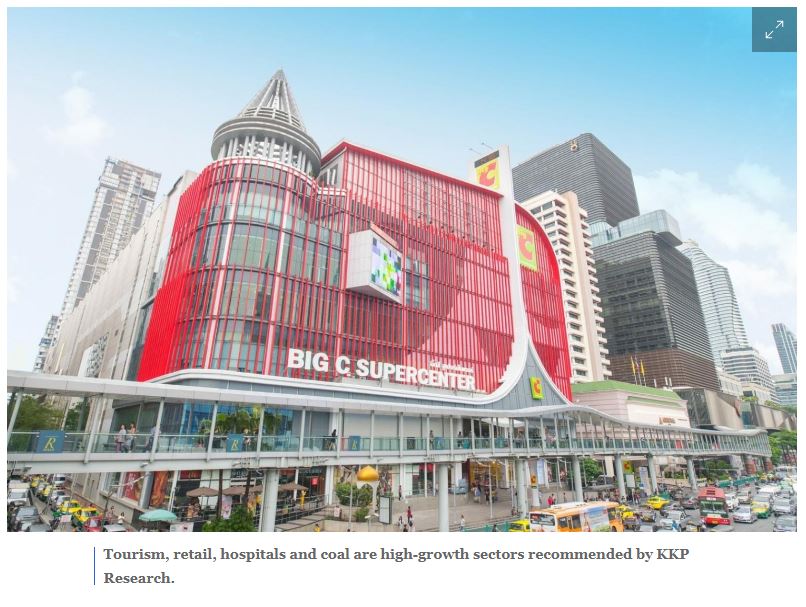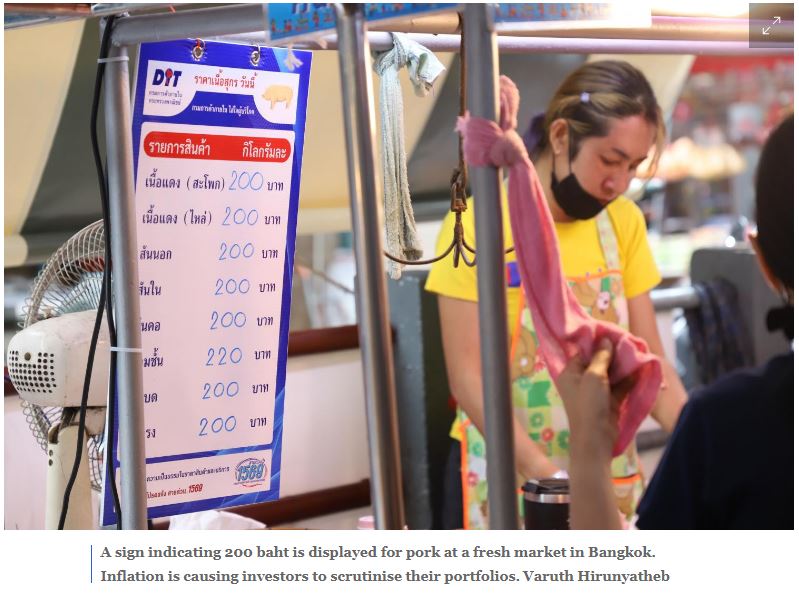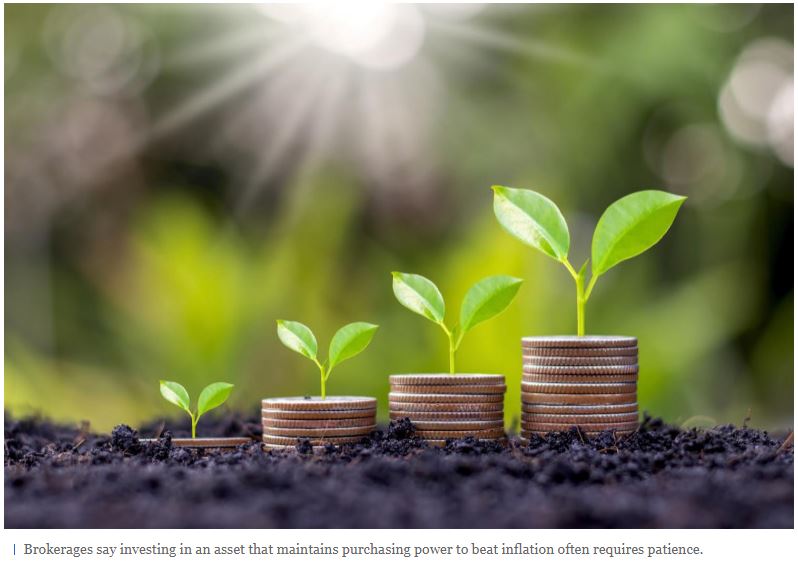Thailand: Searching for inflation-busters
What are good investments in a period of high inflation?
Inflation is a concern for many investors, with the continuing Russia-Ukraine war spiking energy prices considerably this year, driving global inflation to skyrocket.
The Commerce Ministry revised Thailand’s 2022 headline inflation forecast to 5.5-6.5%. In June, inflation rose to nearly a 14-year high of 7.66%, driven mainly by high prices of oil, cooking gas and electricity. In July, it eased to 7.61%.
The Thai interest rate is 0.75%, with the expectation the Bank of Thailand will increase the rate two more times this year, leaving it at 1.25% by year-end, much lower than the inflation rate.
Depositing money in an interest-bearing account at a bank means money depreciates when inflation is subtracted. For example, depositing 100 baht in an account paying 0.75% interest when inflation is 6% means the asset would lose value.

NEGATIVE OUTLOOK
Looking ahead, the Russia-Ukraine war shows no signs of abating and tensions escalated when Russia’s largest natural gas exporter Gazprom shut down its pipeline to Germany and the rest of Europe, indicating it is closed for maintenance for 3-4 days.
Germany claims Russia is using gas shipments as a political weapon, with autumn approaching in Europe and energy prices rising, as the gas shortage drives inflation to surge further.
To tame inflation, many countries have hiked interest rates. Some countries are unable to increase rates because their economy has not recovered. Higher interest rates could stall out these economies.
Economists suggest several methods to curb inflation, such as controlling goods prices, issuing government bonds, hiking interest rates or applying other monetary and fiscal policies.
The US and EU raised interest rates, while Japan maintained its rate.
In China, where Covid-19 spread remains a top government concern, there is a chance economic stimulus measures could be introduced.
All of these factors make investing difficult. Investment returns on many assets are poor in such an environment.
Returns on bond investments are starting to deteriorate as interest rates rise, while stock investors are experiencing global market volatility as fund flows spin back and forth in search of positive returns.
RECOMMENDATIONS
Is there any type of asset to fight inflation that doesn’t fluctuate much? SET Invest Now, the investment information unit of the Stock Exchange of Thailand (SET), recommends three types of mutual funds that are attractive and capable of conquering inflation during this period.
I. Inflation Compensation Bond Fund: This fund invests in government bonds that have varying yields based on changes in inflation. Investors receive 100% of the principal back even if the inflation index drops plus compensation, resulting in a return that maintains purchasing power. This type of bond is good at adjusting to inflation.
The holder receives a return via three methods: a fixed return, a return from inflation compensation, and principal plus inflation compensation. This inflation-based bond is attractive because it maintains the value of money when inflation changes, said SET Invest Now. The bond holding period is quite long, meaning it is a good fit for long-term (7-10 years) investors, said the advisory service.
II. Equity Fund: If investors are keen on stocks, they can adjust their investment ratio and look for equity funds rather than focusing on the quality of stocks, particularly those that generate good cash flow and have consistent income even in a weak economy. This group includes health equity funds or infrastructure funds, such as those investing in electricity, water or basic services. During periods of high inflation, utilities are able to adjust prices accordingly, while their services are essential, meaning there is a good chance to provide consistent returns, said SET Invest Now.
Dividend stock funds from large companies with strong cash flows can also cope with investment risks, making them another option.
III. Alternative Asset Fund: Investors are increasingly looking to real estate funds and REITs (real estate investment trusts), which provide relatively consistent returns with a dividend of about 5-8% per year, thanks to income from rent.
Many Thai investors are migrating from volatile stocks to more familiar assets in dealing with inflation, such as gold funds, private equity funds and other alternative investment products, aiming to maintain purchasing power.

DO YOUR HOMEWORK
In summary, investing in times of high inflation requires investors to do more homework, selecting investments in “quality” assets that can grow even when inflation is high.
Chavinda Hanratanakool, chief executive of Krungthai Asset Management (KTAM), said there are some signs that pressure on the central bank to hike the rate has eased. Commodity consumption continued to rise, especially in the energy sector, and the investment outlook is still bright.
Analysts believe demand for oil and gas will continue to increase while supply is limited, making the energy industry very attractive during this period, she said.
“Commodities and energy are interesting investment themes these days. As the Covid-19 situation has eased, it makes the economic recovery trend more apparent,” said Mrs Chavinda.
KTAM recommends two new funds in line with the current environment. The first is KTAM World Energy Fund (KT-ENERGY), which focuses on BGF World Energy Fund, a master fund that invests in stocks of leading global companies that have core businesses in the exploration, development, production or distribution of energy.
Companies in the energy industry benefit from rising prices, making higher profits and dividend payouts more likely, while current share prices are still much lower than the true value, said the brokerage.
The second fund is KTAM World Metal and Mining Fund (KT-MINING), which focuses on investing in Allianz Global Metals and Mining Fund. The master fund focuses on stocks that have businesses related to the exploration, drilling, processing and mining of metals and minerals. The fund is attractive because commodities prices have continued to rise in recent years as the world’s economy recovers, said the brokerage.
BUYER’S MARKET
Kiatnakin Phatra (KKP) Research recommends several sectors with good growth prospects for the rest of the year. In travel, Minor International (MINT) is recovering from pent-up demand. The brokerage expects its hotel and restaurant businesses both in Thailand and abroad to recover in the second half of 2022, thanks to business reopening and return of tourists.
In the hospital sector, Bangkok Dusit Medical Services (BDMS) has shown strong continuous growth, which should be maintained as international patients returned in greater numbers than expected, while domestic demand also looks healthy, said KKP Research.
For exports, GFPT expects earnings to continue to grow well in the second half, driven by seasonally high export sales in the third quarter, while meat prices remained high on the back of slow meat gains. The cost of animal food is lower, so the profit margin should increase, according to the brokerage.
In the consumer product sector, consumption continues to improve and Berli Jucker (BJC) is well-placed to benefit from the recovery, said KKP Research. Sales from the Big C retail business and rental income have gained, while consumer goods and packaging businesses have been helped by lower commodity prices. While the share price remains attractive, it is trading at a lower level than other retailers, said the brokerage.
Electricity prices are boosting profit margins and B.Grimm Power (BGRIM) is benefiting from rising rates. KKP Research expects gross margins to grow further next year when gas prices from the Gulf of Thailand decrease, meaning profit margin will be a positive factor to support share price.
Banks look promising amid the interest rate hikes, with Bangkok Bank (BBL) posting a strong balance sheet, high liquidity and a corporate loan portfolio. In addition, BBL has high provisioning, making it is less risky compared with other banks amid economic uncertainties. The share valuation for BBL is still attractive, according to KKP Research.
The increase in coal prices makes BANPU interesting as rates are expected to remain elevated, especially during the winter season. Coal demand for electricity generation is high to replace gas-fired power plants in Europe, while coal production in Australia remains stagnant due to weather problems, said the brokerage.
In the oil markets, Thai Oil (TOP) should benefit from higher oil demand, a recovery in gross refining margin, and travel gradually returning to normal. Production in the second half should decline as refineries in the US and Asia shutter, while oil exports from Russia also decrease, according to KKP Research. There is a tendency for European refineries to cut production due to rising gas prices.
Source: https://www.bangkokpost.com/business/2384300/searching-for-inflation-busters


 English
English




